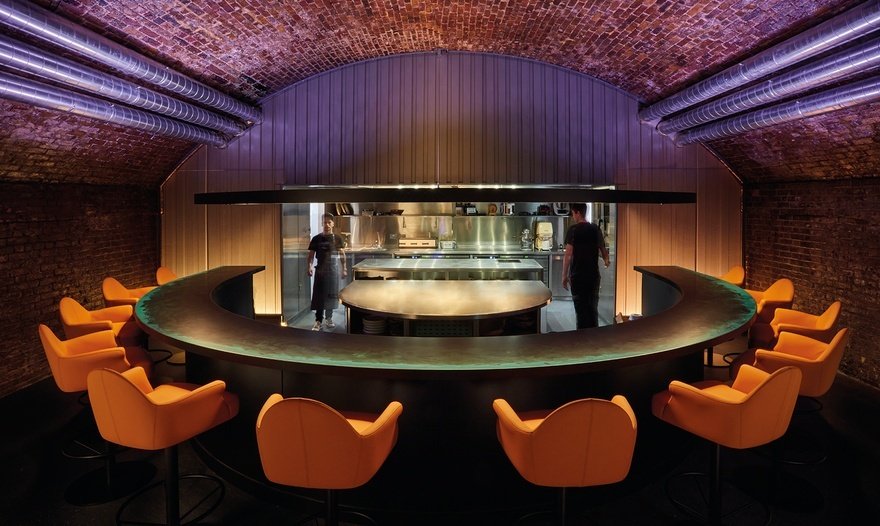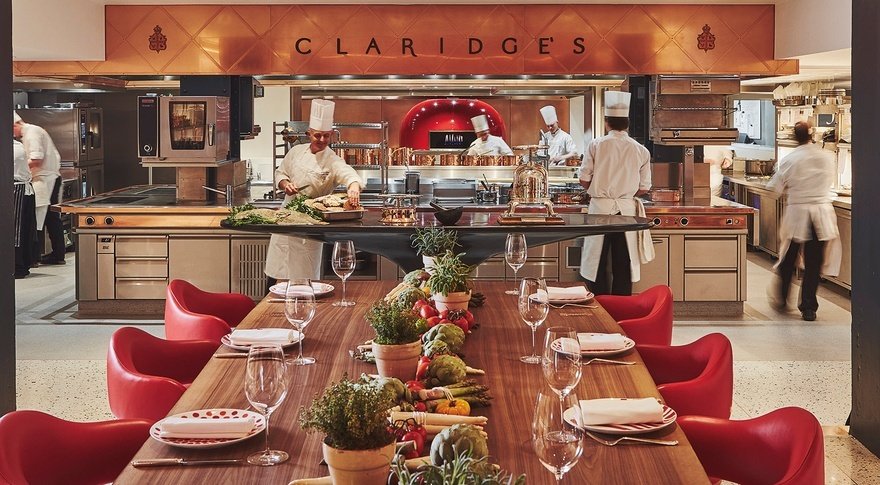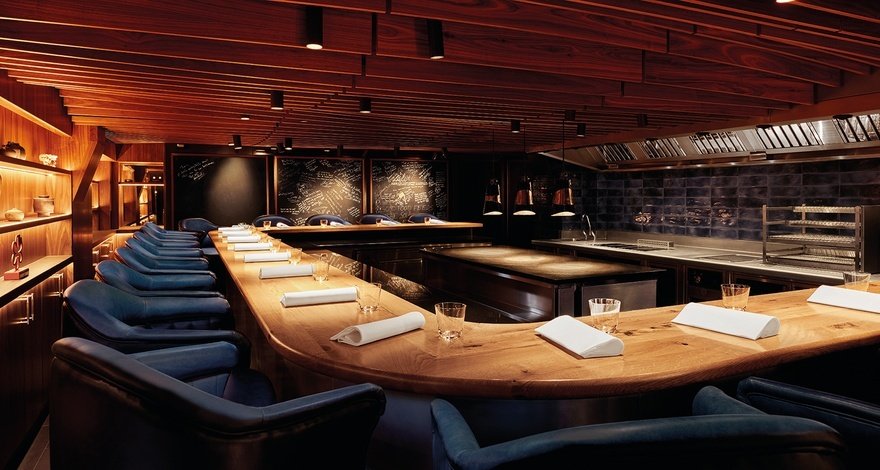Chef's tables can be a place where guests gather for a generous sharing experience, or where a chef showcases their art on an intimate scale. Ben McCormack reports.
It's a brave chef who allows guests to see inside their kitchen. And it's an even braver one who lets customers witness the unloading of the raw materials that will go into their meal. Yet customers who sign up for the £150-a-head, 14-course tasting menu at the new Hackney outpost of The Sea, The Sea get to dine in what founder Alex Hunter describes as primarily a wholesale facility.
The first of the evening's two services begins at 6pm, which is usually the time Hunter's dedicated drivers pitch up with a catch landed from a co-operative of day-boat fishers in Cornwall, Devon and Dorset. "As guests arrive, the fish is being unloaded from the van," Hunter says. "They walk through what we call a transition corridor where they can see the fish prep room and the walk-in fridge. It's an immersive experience that leads them through to the chef's table, which is the showcase for the product."
Hunter, who co-founded Bonnie Gull and supplies restaurants including the Clove Club, Endo at the Rotunda, Evelyn's Table and Ikoyi, opened the 12-seat chef's table in September after the runaway success of the 20-seat counter at the original The Sea, The Sea, a fishmonger-cum-seafood bar in Chelsea. The wholesale function of the Hackney site meant there simply wasn't space to shoehorn a larger dining room onto the new premises, but Hunter says it was always his intention to stay small.
"The size allows us to showcase projects in a special environment with extra care and attention to detail," he explains. "I don't have experience of operating big restaurants and, frankly, it just looks like a constant headache because you lose an element of control. We're dealing with an expensive product which is more expensive than ever, and we're only interested in serving the best seafood, for which we have to charge a fairly high price point. That leads to a smaller market, which needs an experience that reflects the price point."
Not that diners appear to have been deterred by the cost. The September and October chef's table bookings both sold out, with diners eager to experience the cooking of executive chef Leandro Carreira, while November is also looking strong.
It's been a similar story at Claridge's, which launched L'Epicerie in September. The 14-seat chef's table is located within the heart of the main hotel kitchen and is bookable for private groups from £150 a guest. In a typical week in October, L'Epicerie was reserved for 10 of the 14 services that were available. "People want to celebrate," executive chef Martyn Nail explains. "And they want to have a great time with their circle of friends."
Family style
Chef's tables in the heart of the kitchen are nothing new in London's grandest hotels; Hélène Darroze at Claridge's sister property the Connaught installed one when the restaurant was refurbished in 2019 – but where L'Epicerie differs is in the amount of choice it offers to diners and the level of interaction they can have with the chefs. Guests can lend a hand with the preparation of each course or even make a pizza, should they wish, while Nail says that 99% of customers order from the à la carte Foyer menu.
"It's definitely not a tasting-menu experience," he says. "People want choice and they don't want to be told what to eat. We serve everything from tuna tartare and grilled turbot to pastas and pizza. We also have a few sharing plates on the menu, like lobster Wellington. When we put those down the middle of the table with some sides and salads, it creates a lavish, family-style banquet that elevates the experience into a very individual evening."
Nonetheless, it is the opportunity to offer a tasting menu with the kind of control that Hunter enjoys that leads most chefs to open a small dining space. In October, Sven-Hanson Britt launched his debut restaurant Oxeye in Embassy Gardens in south London. A finalist in both MasterChef: The Professionals in 2014 and the Roux Scholarship in 2018, and the winner of MasterChef: The Professionals: Rematch in 2019, Britt could probably have filled a 100-cover dining room nightly. Instead, Oxeye seats up to 16 guests over six tables, though the room itself could easily accommodate 100.
So why not open something with more covers? "There are really two angles," he explains. "The first is control, and not wanting to open a restaurant that is a front for a venture capital company. The other is that the whole point of Oxeye and the food that we cook is hyper-seasonality and amazing ingredients that might only be available by the handful. It would be impossible to do that with a massive restaurant."
Oxeye offers one sitting, three days a week, and serves an eight-course tasting menu for £99. Diners arrive at the restaurant between 6.30pm and 7.15pm for apéritifs and snacks before everyone is seated at 7.30pm. The small number of guests and the fixed seating time allow Britt to serve a single dish for the entire room. Initially that will be a whole turbot or brill cooked on the bone and served with what the chef calls "sauce Tillington": an English twist on a classic Champagne sauce, made with Nyetimber Tillington sparkling wine, produced from a single vineyard in West Sussex.
"The whole deliciousness of that dish is cooking a fish on the bone and slicing it into however many pieces there are people in the room, then finishing the sauce at the table," Britt says. "It is a very classic way of cooking but brought into the modern world with the use of English sparkling wine and the way that we serve it. There's no way that could happen in a big dining room."
While all the chefs that The Caterer spoke to agreed that the communal aspect of small restaurants appeals to diners following the social isolation of the past 18 months, they were also quick to point out that their new projects were in the pipeline long before anyone had heard of Covid-19. It is the very modernity of this way of dining that they believe strikes a chord with the restaurant-goer of the 2020s.
"It encourages a different and younger person into fine dining," says Alex Payne, head chef of Crockers in Henley-on-Thames. "When I started cooking, a chef said to me that fine dining is going to die out because you can't have a laugh, you have to wear certain clothes and you don't want to get the tablecloth dirty. People like to joke with their partner at the dinner table and this way of eating allows them to do that."
Payne and his team have been at Crockers since May. The 16-seat chef's table opened in August 2020 and is reached via the main dining room – not unlike the original incarnation of James Knappett's Kitchen Table in London's Fitzrovia, which was accessed via gourmet hot-dog specialist Bubbledogs. Knappett and his partner Sandia Chang took the decision during lockdown to transform Bubbledogs into a lounge for the two-Michelin-starred Kitchen Table. Instant waiting lists for the 20-course, £250 tasting menu suggest that it was absolutely the right decision.
"The experience needed to change because it had become a bit too overwhelming for guests in the back room," Knappett says. "Once we'd given them the final petit four and they realised there was nothing else to eat, they would ask for the bill. Now, even after the final petit four has been served in the lounge, people are still staying for an hour or more, having cocktails or another bottle of wine. They are more relaxed because their environment has changed."
Diners might be happy then, but what about the staff? Knappett has four chefs in the open kitchen and seven front of house, which counts as a large brigade compared with the other restaurants that The Caterer spoke to. Hunter and Payne each have three chefs and one front of house, Nail three and three respectively, and Britt five and four.
Every person counts
Sam Ward, managing director of Simon Rogan's Umbel Restaurant Group, admits that it takes a special kind of chef to work in the open kitchen of a tiny restaurant. "A lot of responsibility rests on a very small number of people. I can't thank our team at Aulis London enough for what they do every day. They don't have lots of people to delegate everything to and they all take on a little bit more. Head chef Charlie Taylor might be designing dishes one day and dealing with a wobbly shelf the next."
As well as the eight-seat Aulis in London's Soho, which was refurbished in September – "sharpened up", in Ward's words – Umbel operates a six-seat Aulis at L'Enclume in Cartmel and a 12-seat Aulis in Hong Kong. Ward realised that the two chefs behind the counter in London needed a front-of-house colleague to help them after noticing that the Hong Kong outpost ran more smoothly.
Still, even a team of three does not allow for any slack. What happens if someone phones in sick? "Each person represents a third of the team, so there isn't the flexibility we have at L'Enclume of 15 chefs in the kitchen," Ward says. "The good news is that our executive chef Oli Marlow can step in if needs be, or if anyone wants an extra day off or holiday. For front of house, we'll send someone down from Cartmel. Fortunately, we have a few friends in London too, so we can make it work."
Small restaurants, of course, are nothing new. Marianne Lumb, for instance, ran her 14-seat restaurant Marianne in Notting Hill for five years until 2018. But the recent spate of launches has the feel of an evolution to an established part of the fine-dining landscape rather than the quirk that Lumb's restaurant was.
"I have felt for a long time that dining needs to move in one way or the other," says The Sea, The Sea's Hunter. "It either needs to be a very special experience that can't easily be reproduced at home, or it needs to be affordable, tasty and convenient. And I felt that everything in the middle was going to struggle. Don't forget that before the pandemic we were moving towards a staffing crisis, and rates and rents were way too high. The aftermath of the pandemic has crystallised that."
For operator and guest alike, it seems that small really is beautiful.
‘People like you mess us up'
With only a handful of seats available at a chef's table, the effect of a no-show is even more damaging to the finances than it is in a bigger venue, to say nothing of it unbalancing the atmosphere in the dining room. While many small restaurants will ask customers to pay for the booking up front, not all customers are happy about being charged in the event of cancellation.
"We recently had somebody who cancelled at two o'clock in the afternoon for their six o'clock booking," says Kitchen Table's James Knappett. "They said that it was due to UK travel restrictions, but you can get anywhere in the country now. We said that we would try to fill the seat, but the chances were that someone was not going to pop in within the next two hours and spend that kind of money. We didn't get another booking, so at 5.30pm we charged the customer's card.
"Ten minutes later he was standing in the restaurant saying, if you're going to charge me, I'm going to eat. This was a guy who was up north a minute ago! I treated him like all the other guests, but in the back of my head I was thinking, it's people like you that mess up restaurants."
Break-even tightrope
With tasting menus at £250 and customers paying non-refundable bills up front, outsiders might assume that a small restaurant is a great way to charge a lot of money without the hassle of a lot of customers. "Only people that haven't been to a restaurant like ours would think that," says Oxeye's Sven-Hanson Britt. "When you're watching the love and effort the chefs put in, you'd never think, ‘they're making loads of money off me'. In fact, everybody in the industry has messaged me to ask how I'm covering my costs with just six tables."
Umbel's Sam Ward agrees. "Aulis isn't about making huge amounts of money. It's an opportunity for guests to immerse themselves in what we do. The chef who is talking about the provenance of the dish is the person who was involved with the recipe, with the selection of ingredients on the farm, and cooking and plating the dish."
The Sea, The Sea's Alex Hunter says that while the restaurant must be financially viable, it is far harder to break even with a small number of covers. "Our break-even point is right towards the top of filling out our seats every night. But it would also stress me out if I had hundreds of covers to fill. I've tried to get out of the habit of checking how many seats we've sold. It can easily become an obsessive thing that makes you anxious."
Continue reading
You need to be a premium member to view this. Subscribe from just 99p per week.
Already subscribed? Log In













